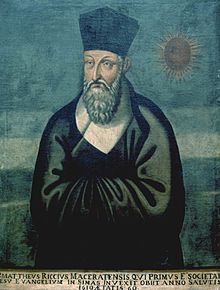Matteo Ricci
|
Servant of God Matteo Ricci |
|
|---|---|
 |
|
| Religion | Roman Catholic |
| Order | Society of Jesus |
| Personal | |
| Born |
6 October 1552 Macerata, Papal States |
| Died | 11 May 1610 (aged 57) Beijing, Ming Empire |
| Resting place | Zhalan cemetery |
| Senior posting | |
| Title | Superior General of the China mission |
| Period in office | 1597–1610 |
| Successor | Nicolò Longobardo |
| Reason for exit | His death |
| Rank | Superior General |
| Religious career | |
| Works | Kunyu Wanguo Quantu |
| Matteo Ricci | |||||||||
| Traditional Chinese | |||||||||
|---|---|---|---|---|---|---|---|---|---|
| Simplified Chinese | |||||||||
|
|||||||||
| Courtesy Name | |||||||||
| Traditional Chinese | |||||||||
| Simplified Chinese | |||||||||
|
|||||||||
| Transcriptions | |
|---|---|
| Standard Mandarin | |
| Hanyu Pinyin | Lì Mǎdòu |
| IPA | [lî màtôu] |
| Transcriptions | |
|---|---|
| Standard Mandarin | |
| Hanyu Pinyin | Xītài |
| IPA | [ɕítʰâi] |
Matteo Ricci, S.J. (Italian: [matˈtɛːo ˈrittʃi]; October 6, 1552 – May 11, 1610), was an Italian Jesuit priest and one of the founding figures of the Jesuit China missions. His 1602 map of the world in Chinese characters introduced the findings of European exploration to East Asia. He is considered a Servant of God in Roman Catholicism.
Ricci arrived at the Portuguese settlement of Macau in 1582 where he began his missionary work in China. He became the first European to enter the Forbidden City of Beijing in 1601 when invited by the Wanli Emperor, who sought his selected services in matters such as court astronomy and calendrical science. He converted several prominent Chinese officials to Catholicism, such as his colleague Xu Guangqi, who aided in translating Euclid's Elements into Chinese as well as the Confucian classics into Latin for the first time.
...
Wikipedia
